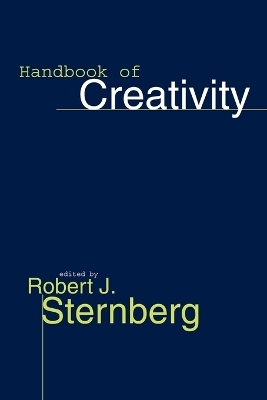
Handbook of Creativity
Cambridge University Press (Verlag)
978-0-521-57604-8 (ISBN)
The goal of the Handbook of Creativity is to provide the most comprehensive, definitive, and authoritative single-volume review available in the field of creativity. To this end, the book contains 22 chapters covering a wide range of issues and topics in the field of creativity, all written by distinguished leaders in the field. The chapters have been written to be accessible to all educated readers with an interest in creative thinking. Although the authors are leading behavioral scientists, people in all disciplines will find the coverage of creativity divided in the arts and sciences to be of interest. The volume is divided into six parts. Part I, the Introduction, sets out the major themes and reviews the history of thinking about creativity. Subsequent parts deal with methods, origins, self and environment, special topics and conclusions.
Part I. Introduction: 1. The concept of creativity: prospects and paradigms Robert J. Sternberg and Todd Lubart; 2. A history of research on creativity Robert S. Albert and Mark Runco; Part II. Methods for Studying Creativity: 3. Psychometric approaches to the study of human creativity Jonathan A. Plucker and Joseph Renzulli; 4. Experimental studies of creativity Mark Runco and Shawn Okuda Sakamoto; 5. The case study method and evolving systems approach for understanding unique creative people at work Howard E. Gruber and Doris Wallace; 6. Creativity from a historiometric perspective Dean Keith Simonton; Part III. Origins of Creativity: 7. Biological bases of creativity Colin Martindale; 8. Evolving creative minds: stories and mechanisms Charles J. Lumsden; 9. The development of creativity David Henry Feldman; Part IV. Creativity, the Self and Environment: 10. Creative cognition Thomas B. Ward, Steven M. Smith and Ronald A. Finke; 11. From case studies to robust generalizations: an approach to the study of creativity Emma Policastro and Howard Gardner; 12. Creativity and knowledge: a challenge to theories Robert W. Weisberg; 13. Creativity and intelligence Robert W. Weisberg and Linda O'Hara; 14. The influence of personality on artistic and scientific creativity Gregory J. Feist; 15. Motivation and creativity Mary Ann Collins and Teresa Amabile; 16. Implications of a systems perspective for the study of creativity Mihaly Csikszentmihalyi; Part V. Special Topics in Creativity: 17. Creativity across cultures Todd I. Lubart; 18. Computer models of creativity Margaret A. Boden; 19. Organizational creativity Wendy M. Williams and Lana T. Yang; 20. Enhancing creativity Raymond S. Nickerson; 21. Prodigies and creativity Michael J. A. Howe; Part VI. Conclusion: 22. Fifty years of creativity research Richard E. Mayer.
| Erscheint lt. Verlag | 28.10.1998 |
|---|---|
| Zusatzinfo | 7 Tables, unspecified; 17 Line drawings, unspecified |
| Verlagsort | Cambridge |
| Sprache | englisch |
| Maße | 157 x 234 mm |
| Gewicht | 700 g |
| Themenwelt | Geisteswissenschaften ► Psychologie ► Allgemeine Psychologie |
| Geisteswissenschaften ► Psychologie ► Verhaltenstherapie | |
| ISBN-10 | 0-521-57604-0 / 0521576040 |
| ISBN-13 | 978-0-521-57604-8 / 9780521576048 |
| Zustand | Neuware |
| Haben Sie eine Frage zum Produkt? |
aus dem Bereich


